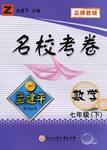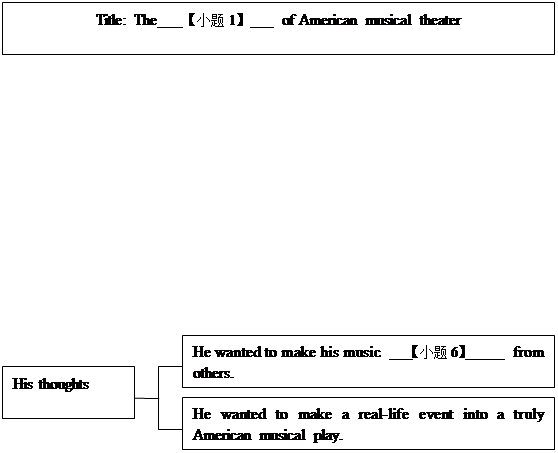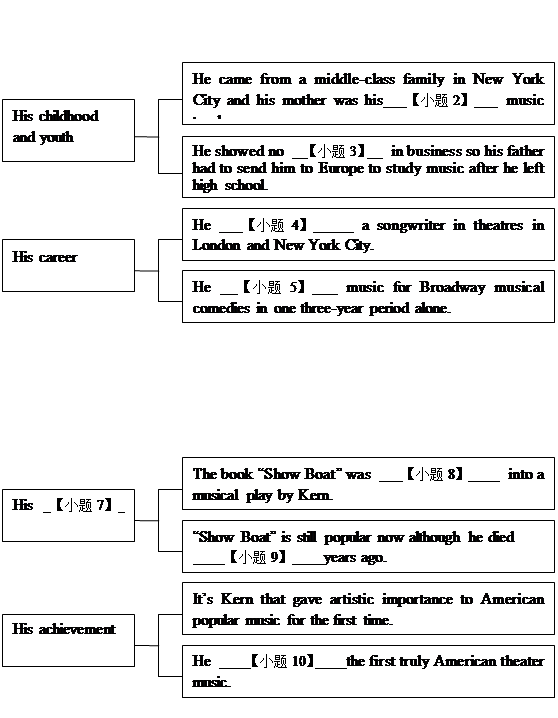题目内容
缺词填空
Will it matter if you don't take your breakfast? A short time ago, a test w__小题1:___ given in the USA. People of different a__小题2:___, from 12 to 83, were asked to have a test. During the test, these people were given all kinds of breakfasts and s __小题3:__ they got no breakfast at all. Scientists wanted to see h___小题4:____well their bodies worked when they had had different kinds of breakfasts.
The results show that if a person e__小题5:___ a right breakfast, he or she will work better than if he or she has no breakfast. If a student has fruit, eggs, bread and milk b__小题6:___going to school, he will learn more quickly a__小题7:_listen more carefully in class.
The results a____小题8:____show that having no breakfast will not h___小题9:____you lose weight. This is because people become so h___小题10:____at noon that they eat too much for lunch. So they will gain weight instead of losing weight.
Will it matter if you don't take your breakfast? A short time ago, a test w__小题1:___ given in the USA. People of different a__小题2:___, from 12 to 83, were asked to have a test. During the test, these people were given all kinds of breakfasts and s __小题3:__ they got no breakfast at all. Scientists wanted to see h___小题4:____well their bodies worked when they had had different kinds of breakfasts.
The results show that if a person e__小题5:___ a right breakfast, he or she will work better than if he or she has no breakfast. If a student has fruit, eggs, bread and milk b__小题6:___going to school, he will learn more quickly a__小题7:_listen more carefully in class.
The results a____小题8:____show that having no breakfast will not h___小题9:____you lose weight. This is because people become so h___小题10:____at noon that they eat too much for lunch. So they will gain weight instead of losing weight.
小题1:was
小题2:ages
小题3:sometimes
小题4:how
小题5:eats
小题6:before
小题7:and
小题8:also
小题9:help
小题10:hungry
试题分析:这篇短文重点介绍了吃不吃早饭对我们的影响,作者通过介绍一个实验,告诉我们不吃早饭不利于我们的工作学习,也无助于减肥。
小题1:联系前文时间状语不久以前,可知本句描述的是过去的动作,结合语境可知本句主语是被动语态,故助动词用is的过去式was.
小题2:联系下文from 12 to 83,可知此处指的是不同的年龄,结合语境及首字母可知填复数名词ages,年龄.
小题3:联系上下文,可知此处指的是有时根本没有早饭,结合首字母可知填副词sometimes,有时.
小题4:结合语境可知科学家们想知道他们的身体工作的怎么样,结合语境及首字母可知填how,怎样.
小题5:联系下文可知此处指的是正常的吃早饭.结合语境可知 本句描述的是客观性动作,故用一般现在时态,主语it是单数第三人称,故谓语动词用单数,结合首字母可知填eats,吃.
小题6:联系上下文,可知此处指的是在去学校前,结合首字母可知填介词before,在……之前。
小题7:联系上下文,可知learn和listen是并列动作,结合首字母可知填并列连词and,和,并且。
小题8:联系下文,可知此处指的是这个结果页表明……,结合首字母可知填副词also,也,同样。
小题9:联系下文,可知此处指的是不吃 早饭无助于你减肥,结合前文助动词will及首字母可知填原形动词help,帮助。
小题10:联系上文,可知此处指的是人们变得如此饿,结合首字母可知填形容词hungry饥饿的。
点评:首字母一直是英语考试中的难点,得分率比较低。解答此类题型的方法一般就是根据文章前后句子之间意思推断出词义,并结合首字母推断出所缺单词,然后根据该单词在句子中的句子成分,所起作用,确定单词词形,进行适当词形变化。

练习册系列答案
 孟建平名校考卷系列答案
孟建平名校考卷系列答案
相关题目


